#Vestals
Explore tagged Tumblr posts
Text
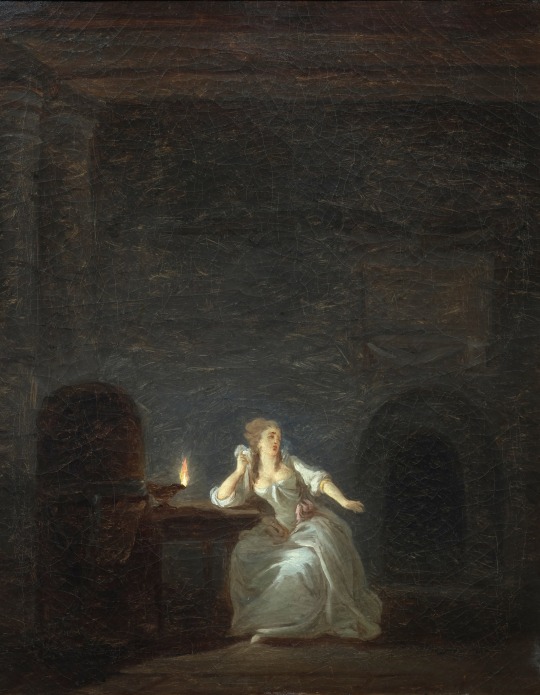
The Torture of the Vestal Virgin by Jean-Frédéric Schall
#jean frédéric schall#art#vestal virgin#roman#priestess#ancient rome#condemned#imprisoned#dungeon#dungeons#france#ancien régime#the terror#the reign of terror#history#europe#european#vestals#priestesses#despair#dress#handkerchief#oil lamp#elegant woman#lamp#light#dark#darkness#neoclassicism#neoclassical
295 notes
·
View notes
Text

Rome's Vestal Virgins: Protectors of The City's Sacred Flame
Chosen as young girls, the priestesses of Vesta, goddess of the hearth, swore a 30-year vow of chastity and in turn were granted rights, privileges, and power unavailable to other women in Rome.
Marcus Licinius Crassus was one of the richest and most powerful Roman citizens in the first century B.C. Yet he nearly lost it all, his life included, when he was accused of being too intimate with Licinia, a Vestal Virgin. He was brought to trial, where his true motives emerged. As the first-century historian Plutarch recounts, Licinia was the owner of “a pleasant villa in the suburbs which Crassus wished to get at a low price, and it was for this reason that he was forever hovering about the woman and paying his court to her.” When it became clear that Crassus’ wooing was motivated by avarice rather than lust, he was acquitted, saving both his and Licinia’s lives.
One of the most remarkable elements of this story is the fact that Licinia owned a villa in the first place. Unlike other women, Licinia could own property precisely because she was a Vestal Virgin. The story of her trial also reveals how that privilege came with a price: A Vestal Virgin had to abstain from sex, a sacred obligation to one of Rome’s most ancient customs that would continue until Christianity ended the cult in A.D. 394.

FIRE GODDESS: The remains of the Temple of Vesta stand in the Roman Forum. Unlike most temples, it did not contain a central image of the goddess. It was the site of the holy fire and a repository of various sacred artifacts.
Vestal Veneration
According to Roman authors, the cult was founded by Numa Pompilius, a semi-mythical Roman king who ruled around 715 to 673 B.C. Unlike most Roman religious cults, worship of Vesta was run by women. The hearth was sacred to this goddess, one of Rome’s three major virgin goddesses (the other two being Minerva and Diana). The rites surrounding the Vestals remained relatively fixed from the time of the Roman Republic through the fourth century A.D.
Six virgin priestesses were dedicated to Vesta as full-time officiates who lived in their own residence, the Atrium Vestae in the Roman Forum. The Vestals’ long tradition gave Romans a reassuring thread of continuity and may explain the Temple of Vesta’s traditional circular form, a style associated with rustic huts in the city’s deep past.

KEEP THE FIRE The Vestal Virgins tend the sacred fire of Vesta, on whose protection Rome depends. 17th-century oil painting by Ciro Ferri, Galleria Spada, Rome
This place of worship, which lay alongside the Atrium, was where the priestesses tended the goddess’s sacred fire. Once a year, in March, they relit the fire and then ensured it remained burning for the next year. Their task was serious as the fire was tied to the fortunes of their city, and neglect would bring disaster to Rome.
To become a Vestal was the luck of the draw. Captio, the process whereby the girls were selected to leave their families and become priestesses, is also the Latin word for “capture”—a telling turn of phrase that evokes the kidnapping of women for brides that took place in archaic Rome. Records from 65 B.C. show that a list of potential Vestals was drawn up by the Pontifex Maximus, Rome’s supreme religious authority. Candidates had to be girls between the ages of six and 10, born to patrician parents, and free from mental and physical defects. Final candidates were then publicly selected by lot. Once initiated, they were sworn to Vesta’s service for 30 years.
On being selected, their life was spent at the Atrium Vestae in a surrogate family, presided over by older Vestals. In addition to room and board, they were entitled to their own bodyguard of lictors. For the first 10 years they were initiates, taught by the older priestesses. Then they became priestesses for a decade before taking on the mentoring duties of the initiates for the last 10 years of their service.
Training the Novices
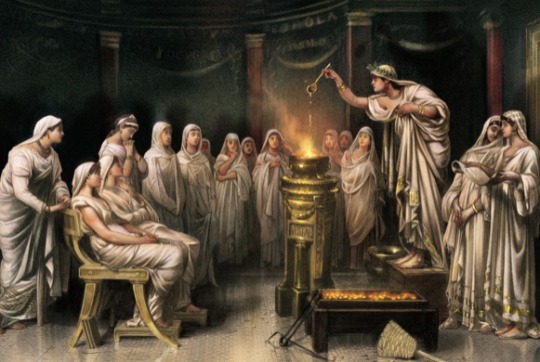
"The School of the Vestal Virgins" 19th-century colorized engraving by L. Hector Leroux.
After lots were drawn from the list of young girls who could serve Vesta, initiates were brought to the Atrium Vestae, where their training would begin. The training was overseen by the chief priestess, the Vestalis Maxima, who came under the authority of the Pontifex Maximus. The first 10 years were spent training for their duties. They would spend the second decade actively administering rites, and the final 10 were spent training novices. The chastity of the priestesses was a reflection of the health of Rome itself. Although spilling a virgin’s blood to kill her was a sin, this did not preclude the infliction of harsh corporal punishment. First-century historian Plutarch writes: “If these Vestals commit any minor fault, they are punishable by the high-priest only, who scourges the offender.”
Public monies and donations to the order funded the cult and the priestesses. In Rome religion and government were tightly intertwined. The organization of the state closely mirrored that of the basic Roman institution: the family. The center of life of the Roman home, or domus, was the hearth, tended by the matriarch for the good of her family and husband. In the same way, the Vestals tended Vesta’s flame for the good of the state.
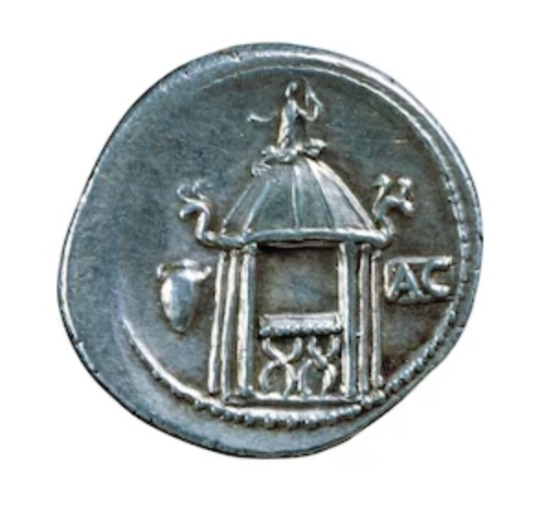
A silver denarius, also from the second century B.C., bears a representation of the circular Temple of Vesta.
Unlike other Roman women, Vestals enjoyed certain privileges: In addition to being able to own property and enjoying certain tax exemptions, Vestals were emancipated from their family’s patria potestas, patriarchal power. They could make their own wills and give evidence in a court of law without being obliged to swear an oath.
Thirty Years of Chastity
These rights came at a high price: 30 years of enforced chastity. Many historians believe that the health of the state was tied to the virtue of its women; because the Vestals’ purity was both highly visible and holy, penalties for a Vestal breaking her vow of chastity were draconian. As it was forbidden to shed a Vestal Virgin’s blood, the method of execution was immuration: being bricked up in a chamber and left to starve to death. Punishment for her sexual partner was just as brutal: death by whipping. Throughout Roman history, instances are cited of these grim sentences being passed.
Jealousy or malice made the women vulnerable to false accusations. One story, celebrated by several Roman writers, concerns the miracle of the Vestal Virgin Tuccia, who was falsely accused of being unchaste. According to tradition, Tuccia beseeched Vesta for help and miraculously proved her innocence by carrying a sieve full of water from the Tiber.
Allegations of crimes against the Vestals’ chastity sometimes went to the top of the social order. The flamboyantly eccentric, third-century emperor Elagabalus actually married a serving Vestal Virgin. It is a sign of the enduring symbolic importance of the cult that this heresy was one major factor that led to his deposal and murder.

The Vestal Tuccia, falsey accused of breaking her chastity vow, is saved by the intervention of Vesta, who enables her to carry water in a sieve from the Tiber back to the temple. 17th-century painting by Giovanni Battista Beinaschi.
Vestal Vestments
The ceremonial dress of Vestals highlights their dual, and somewhat contradictory, embodiment of both the maternal and the chaste. Physical appearance was an integral part of their role, making them stand out as different from other women, but also echoing physical traits of conventional women.
Dressed in white, the color of purity, the Vestal Virgins wore stola, long gowns worn by Roman matrons. Hair and headdresses played an important symbolic function. The Vestal hairstyle is described in Roman sources using an ancient Latin phrase, the seni crines. Historians cautiously agree it means “sixbraids,” and is mentioned as the coiffure of both Vestal Virgins and brides. A Vestal wore the suffibulum, a short, white cloth similar to a bride’s veil, kept in place with a brooch, the fibula. Around their heads they wore a headband, the infula, which was associated with Roman matrons.
Daily rites for Vestals were often centered around the temple. Most important was maintaining the holy fire. If the fire went out, the attending Vestals would be suspected not only of neglect but also of licentiousness, since it was believed impurity in a Vestal’s relations would cause a fire to go out. Other typical duties included the purification of the temple with water, which had to be drawn from a running stream. In readiness for the numerous festivals that required their attendance, the priestesses were required to bake salsa mola, a cake of meal and salt that was sprinkled on the horns of sacrificed animals. Important religious festivals included the Vestalia, dedicated to their goddess, Vesta, and the Lupercalia, which highlights the contradictory role of the Vestal Virgins, as it was closely associated with fertility.

A representation of a Vestal Virgin.
A Roman Tradition

A bust of Numa Pompilius from the Villa Albani Museum in Rome, believed to have been sculpted in the Roman Imperial Period.
Romans believed the cult of the Vestal Virgins was instituted under the eighth-century B.C. king Numa Pompilius, the successor of Rome’s founder, Romulus. First-century A.D. historian Plutarch wrote that Numa may have “considered the nature of fire to be pure and uncorrupted and so entrusted it to uncontaminated and undefiled bodies.“ Numa is credited by Livy, in his History of Rome, with formalizing other key Roman cults, including those of Jupiter and Mars. Many historians believe Numa was legendary, and that the worship of Vesta and other cults developed slowly out of pre-Roman customs, perhaps dating back to the older Etruscan culture that dominated Italy before the rise of Rome.
In the innermost part of their temple, the priestesses looked after their secret talismans. Among these objects was the sacred phallus, the fascinus, the representation of a minor god of the same name. The fascinus (the root of the word “fascinate”) is closely bound with magic and fertility. It was also in this part of the temple that they probably kept the palladium, the statue of Pallas Athena that the legendary founder of Rome, Aeneas, brought to Italy after the destruction of Troy, his home city—another aspect of the Vestal cult that tied Rome’s origins into an ennobling and ancient tradition.
Romans regarded these priestesses with a sense of awe. Plutarch points out “they were also keepers of other divine secrets, concealed from all but themselves.” It was believed they possessed magical powers: If anybody condemned to death saw a Vestal on his way to being executed, he was to be freed, so long as it could be proven the meeting was not by design. Vestals, it was said, could stop a runaway slave in his tracks.
The privileged position of the Vestal Virgins in Roman society survived for more than a thousand years, passing through Rome’s changing systems of monarchy, republic, and empire. The cult would not, however, survive Christianity. In A.D. 394 Theodosius closed the House of the Vestals forever, freeing the virgins from their obligations, but also removing their privileges.

VIEW OF THE VESTAThe ruins of the Atrium Vestae stand in the Roman Forum. The rectangular pools formed a part of the complex’s long, central patio. To the right of the Atrium are the remains of the Temple of Vesta, and behind the wall are the three remaining columns of the Temple of Castor and Pollux.
Even as their flame was extinguished, aspects of the cult may have passed into the new faith as it swept through the Mediterranean. Just as the position of the Pontifex Maximus lived on in the papal title “pontiff,” young women in the early years of Roman Christianity embraced virginity and celibacy in their desire to be “eunuchs for the love of heaven.” Scholars believe the role of the Christian nun was inspired, in part, by the chaste figures who dutifully tended the holy flame of Vesta.
By Elda Biggi.

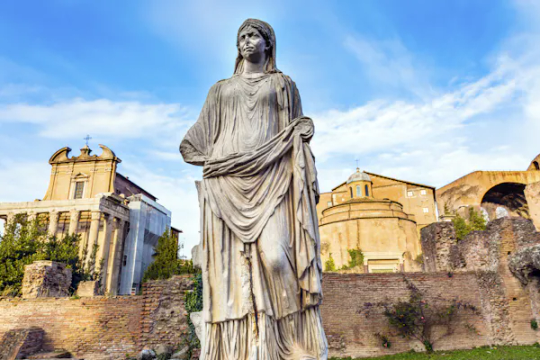

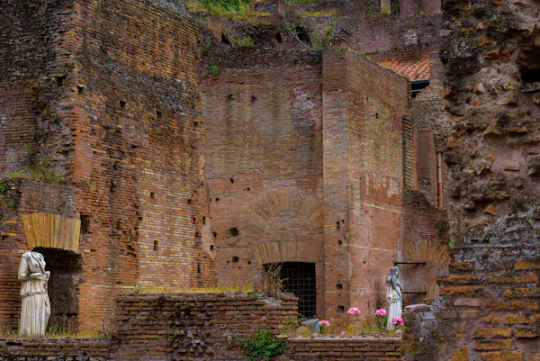
#Vestals#Vestal Virgins#Priestesses of Vesta#Rome's Vestal Virgins: Protectors of The City's Sacred Flame#ancient artifacts#archeology#archeolgst#history#history news#ancient history#ancient culture#ancient civilizations#ancient rome#roman history#roman empire#roman emperors#roman art#ancient art#art history#long post#long reads
33 notes
·
View notes
Text
Michael A. Muller — Mirror Music (Deutsche Grammophon)

youtube
Ten independent artists — largely from the improvised, jazz-adjacent ambient side of things — venture into Michael A. Muller’s glowing, swirling soundscapes, each finding and bringing different textures there. Muller, a founder of the Texas minimalist music collective Balmorhea, sticks to long-toned, keyboard-based instruments: a Mellotron, an Oberheim Two-Voice Synthesizer and a Rhodes organ, creating luminous auras of tone. His collaborators play a variety of instruments — guitar, percussion, voice and cello — populating these edgeless, serene sonic spaces with melody and rhythm.
Muller himself plays the guitar, and he seems to have a particular affinity for its devotees. Bay Area finger-picker Danny Paul Grody scatters sparkly chords and meditative runs across synthesizer washes that surge and swell and ebb. Without the guitar, these tones might be too unreal, too grand, too beautiful to catch, but with these slow-blooming, organic figures, the music makes sense on a human scale. Chuck Johnson is a different case. His silvery sustained pedal steel music contains its own uncanny valleys, and so he slides like a ghost between shimmering, vibrating curtains, carving aching arcs of longing into a chilled, cerebral landscape. Douglas McCombs, of Tortoise, Brokeback and Black Duck, picks a clean, reverberating, almost surf-toned melody across an oscillating, shifting, reverential backdrop; he cuts right through it, emphatic and sure.
Women artists make a mark, though mostly with their voices. Vestals float eerie, altered sighs and caresses over the clear tones of Rhodes, a piercing descant one of this disc’s most gorgeous sounds. The Polish composer and pianist Hania Rani also sings, in a whisper amid shivering ambiences, in a way that reminds me a little of Mia Doi Todd. But Clarice Jensen, who sometimes plays with Balmorhea, brings her instrument along, threading rich throbs of cello through a landscape of widely spaced piano chords.
In the mirror game, budding actors stand face to face, copying each other’s expressions and gestures in real time, in a sort of synchronized dance. Here, the interaction is more oblique, with each artist staring into a foggy reflection and finding some element of themselves there. The music that arises is hardly synchronized, but the players find a way to react and build on what the other is doing. Oh, and it’s lovely. That’s important, too.
Jennifer Kelly
#michael a. muller#mirror music#deutsche grammophon#jennifer kelly#albumreview#dusted magazine#balmorhea#danny paul grody#chuck johnson#vestals#doug mccombs
4 notes
·
View notes
Text

Look, I drew another meme
2K notes
·
View notes
Text
youtube
Find A Song about the Vestals of ancient Rome
Hallan - The Colline Gate
Speaking ahead of its release, charismatic frontman Conor Clements stated: “The sinister and foreboding shadow of ‘The Colline Gate’ remains cast upon the terrifying truth that lurks beneath. Our foray into a more electronic sound comes by way of Ancient Rome’s debauched past times and the Vestal Virgins who met their untimely end beneath this mysterious landmark.
The Vestals of Rome embodied both purity and sanctity, tending to the flame of Vesta as untouchable priestesses. Vestals found to break Rome’s strict rules were subject to a live burial beneath The Colline Gate”.
Added to FAS Spotify playlist alt rock.
#music#music blog#indie music#alternative music#alt rock#Hallan#The Colline Gate#Vestals#indie#alternative#find a song
0 notes
Text
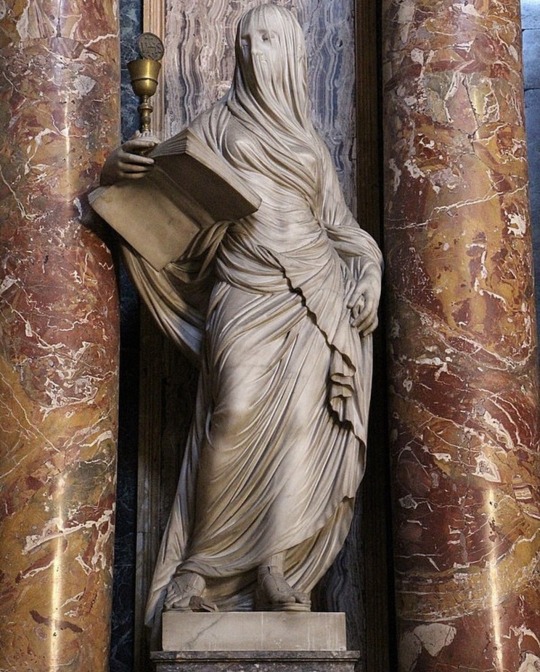
The Vestal Virgin Tuccia. Veiled Woman at the Palazzo Barberini, Rome. Created by Antonio Corradini (1743)
2K notes
·
View notes
Text

If you do what you love, you’ll never work a day in your life 💖
#darkest dungeon#darkest dungeon 2#vestal#abomination#flagellant#its really funny how the flagellant just beats the shit out of everyone in their backstory confessions#GIVE THEM A BREAK MAN
596 notes
·
View notes
Text


the vestal (frederic leighton, ca. 1882-83) // charles leclerc (dan istitene, 2023)
(charles x art, 41/?)
#pip.txt#charles leclerc#f1#charles x art#thank u dees for sourcing this chimage... a perfect match...#vestal virgin charles is something that can be so personal--
693 notes
·
View notes
Text
A normal day at the Hamlet
#darkest dungeon#darkest dungeon 2#dd highwayman#dd vestal#dd junia#dd dismas#dd leper#dd baldwin#dd jester#dd sarmenti#dd occultist#dd alhazred#dd plague doctor#dd paracelsus#my art#boop's animatic
1K notes
·
View notes
Text

The Vestal Virgins by Jean Raoux
#vestal virgins#art#jean raoux#ancient#ancient rome#roman#rome#vestals#vesta#goddess#priestesses#priestess#europe#european#history#antiquity#sacred#hearth#flame#flames#architecture#temple#temples#temple of vesta#italy
483 notes
·
View notes
Text






ive been having fun with darkest dungeon recently eheheh
2K notes
·
View notes
Text

Portrait Of A Lady As A Vestal Virgin Angelica Kauffmann
#Angelica Kauffmann#swiss art#neo classicism#female painter#female artists#18th century#art#painting#art history#fashion#portrait#fashion history#vestal
563 notes
·
View notes
Text

I don’t think I posted this here??
#darkest dungeon#darkest dungeon 2#dd2#vestal#junia#jester#Sarmenti#dismas#highwayman#tardif#bounty hunter#chibi#comic#mini comic#my art#pupsart
349 notes
·
View notes
Photo

shes my wife
4K notes
·
View notes
Text
Dulcissima I Marcus Acacius x Vestal!Reader I Chapter I

! This Fic contains major spoilers for Gladiator II ! Proceed with caution !
Spoiler-Free Summary: Set before and during Gladiator II. General Acacius finds himself entranced by a highly valued priestess of Rome – A Vestal Virgin. Both have taken vows that make sure their paths may never cross. Until they do.
Pairing: Marcus Acacius x F!Vestal!Reader Rating: Explicit / MDNI Word count: 12k+ Tags: Secret Relationship, Vestal Virgins, Religious Guilt, Gladiator fights, Gladiator II compliant (more or less), Hurt/Comfort, Angst, Ancient Rome, Age Difference, Slow Burn(ish), Injry, Kissing, Historical Inaccuracy, (Attempted) Sexual Harassment, More tags to be added
AO3 I Series Masterlist I Masterlist
notes: ! last major spoiler warning for gladiator II below the cut !

guys, where do we even start. i can't live with his end so i am rewriting it. enjoy <3
vestal (vigins) - priestesses of vesta, virgin goddess of Rome's sacred flame (details will be explained later in the story) dulcissima - sweetest (fond nickname) domus - a roman house posticum - a servant's entrance cubiculas - roman bedrooms
You didn't think it would lead to this.
A beloved General, a just man, kneeling in front of his opponent in the sand that covers the arena floor, the cloud of its dust settling onto the two men facing each other. The particles glisten in the scorching heat of the relentless sun above you, just as violent as the battle you have just witnessed.
It is not something you have ever truly enjoyed, hearing the last gasp of a dying man, seeing the moment a blade enters his stomach. Watching the winner shout with glee. Watching the dead body be dragged away.
But sitting in the specifically reserved area near the Emperors is good custom. Custom keeps one alive.
Custom is also hard to uphold when the man your heart is set on is fighting to keep his life mere feet below you.
You see Acacius’s lips move, see the pleading look in his eyes.
And then a soft thud echoes through the Colosseum as Lucius drops his sword and falls to his knees across from the General.
You wipe your hands furiously on your white gown, trying to keep your hands from sweating as your heart pumps wildly in your chest. You wonder what would happen to it if the sword would've found Acacius’s torso instead. Or his neck. Maybe it would've just given out, unwilling to beat any longer if his was not doing the same.
“No! Kill him! Soldiers!” The Emperor's cries reach you even through the uproar of the crowd, which is unwilling to accept any match that doesn't end with death. Rome always wants death.
“Archers!” He yells and you hold your breath as they draw their bows in unison, tips pointed right into the middle of the arena where the two men are still kneeling.
“Move,” you whisper under your breath, almost as if you believe Acacius can hear you. But he doesn't. He stays on his knees, upright, seemingly waiting for the arrows to hit. An archer to your left releases his arrow with a slight tremor in his arm–and misses by inches. It hits the sand behind Lucius instead, a small cloud of dust rising around it. But your eyes are drawn to the gentle movement of the General as he raises his arm.
“Hold.”
He doesn't have to scream the command. But his deep voice still travels throughout the Colosseum with urgency. The voice of a man who knows how to instruct his soldiers, how to make himself heard even on the battlefield, in the face of death. Even if it's his own that is imminent.
His reminder rings out in your head.
“How many of them will be loyal to you?” – “All of them.”
The archers hold their fire, no arrows following the first one. You turn your head to catch a glimpse of the twin Emperors, both practically jumping up and down with fury as they yell at the archers, at the guards, at anyone who will listen. “We'll have his head! We'll have the General's head for this! How dare he defy us–”
The bows are lowered as soldiers march into the arena, roughly placing cuffs around both men's hands. Acacius doesn't try to intervene with their orders this time, slowly rising to his feet and letting them lead him back towards the gate, though you don't miss the small stagger in his step. It makes a wave of worry wash over you.
“We’ll have your head, General! You will not live to see another battle! You will not even live to see another sunrise!”
Your blood runs cold at that and you stand up abruptly, your head bowed as your feet carry you back into the outer corridor of the Colosseum, a light breeze greeting you as the angry yells and curses from inside the arena grow more quiet.
You have given everything for Rome. Your vows, your service. You will not give him.
***
The moon is hiding away behind a large cloud when you slip out of the house and onto Via Nova, the sounds of cicadas and the occasional bark of a dog filling the night. Having fulfilled your duties for the evening and claimed that the scene at the Colosseum gave you a dull headache, you retired early. When the sounds of the other women in the house died down, you took your chance.
It isn't far to the domus Acacius and Lucilla reside in, your own quarters located just below Palatine Hill. On a clear day, you can see the stone walls of his house from the garden you use to grow herbs.
After about fifty feet, you turn, following down a more narrow path that allows you to travel in the shadows. A few minutes later, it leads you to the posticum of the noble home, an entrance off to the side, used mainly by the servants–or visitors unwilling to be seen. Acacius has taken to keeping it unlocked whenever he knows you are coming. You pray that it still is.
A light push against the wooden door is all it needs to swing open with a small creak, making you hold your breath as you place one careful foot in front of the other. The last thing you need is to alert any guards to your nightly visit.
But you’ve learned how to walk in the shadows and which streets to avoid. You know that the second step from the bottom creaks if you put too much weight on it. It feels like the stone walls of his house are silent witnesses to the amount of time you have spent tip-toeing to his quarters after everyone else has retired for the night.
You distantly wonder if they have allowed him the comfort of his own bed as you enter the atrium, already turning right towards the cubiculas–and pause when your gaze flickers around the open space.
Acacius is hunched over on a chair, a thick metal cuff sneaking around his ankle, the chain fastened securely around one of the columns that line each side of the open room. Your breath catches in your throat as you notice that he is wearing nothing but his red tunic, the gold details on the edges already worn and fading. He shivers in the cold night air, his arms wrapped protectively around himself. He looks so different from how he did in the arena just mere hours earlier. Smaller, somehow.
When you step forward, his head turns, eyes widening as you step into the dim light and recognition flickers over his face. “Dulcissima.”
You try to give him a smile but you're sure it fails miserably. Instead, you lessen the distance between you, passing the fountain in the center. “Acacius–”
“By the gods, what are you doing here?” He whispers, his soft brown eyes looking up at you. He sounds scared, his voice quiet but rough. Up close, you find that not only have they left him chained up in his own atrium but they have also not tended to his wounds. Caked blood and dirt decorate his skin, a part of his hair matted down with something that you hope is the latter.
You ignore his question. “They sentenced you to death.” No matter how hard you try, you can't keep your voice from shaking.
“They sentenced me to death the moment they learned about the plot,” Acacius mumbles quietly. “You know this. It was always going to end this way.”
“Where is Lucilla?” You ask quietly, casting a quick glance around yourself, almost expecting her to step forward from behind one of the columns. Even if you know you have nothing to fear from her. In fact, she may be the only person who understands what you are currently feeling.
“She is with two of the men. On their way to Lucius,” he admits, turning his body a bit more into your direction, which immediately forces a small grunt out of him. You suck in a sharp breath, though you're not sure whether it's in response to his injury or to what you just learned.
“He may already be dead.”
Acacius glances up at you with a look you can't quite place. Then he nods. “He may be.” He shakes his head ever so slightly. “But he has friends in the Colosseum. You forget whose son he is.” The General pauses again, his eyes searching your face as his whisper becomes more urgent. “Why are you here?”
A small sigh escapes you as you take two more steps towards Acacius. “Because you forgot who I am.”
It takes a few moments before recognition flickers in his eyes–and he understands. That as a Vestal, you may pardon with a touch of your hand. Even slaves. Even those sentenced to death.
He has seen you do it, once or twice. When prisoners called out to you as you passed by them with the jug of holy water. Begged you to place your palm on their head, to allow them to live. And they did. But this? This is different.
“No.”
“Marcus,” you say softly. “It’s the power they have given me, the role they have cursed me with. I may as well use it for good.”
“Dulcissima, they will know,” he protests, wincing slightly as he shifts his weight onto his legs and stands up. “They will know about us. They do not even need proof to put you on trial.”
“I do not care if they put me on trial,” you blurt out, taking a step forward just as he takes two back.
“Do not lay your hand on me,” he warns, raising his hand not unlike the way he did in the Colosseum earlier.
“Marcus. Please.” You’re begging more than asking. You don't think you could take it. A Rome without him.
His back hits the marble column and he curses under his breath just as you reach him. The chains meant to keep him from escaping turn into chains that make sure you can save him. Even if he does not want saving.
The tremor that has been a constant in your hands since seeing Acacius fall to his knees in the arena has disappeared, your fingers stretching slightly as you stand on tiptoes to reach for his head.
Soft, dark curls greet the tips of your fingers and you sigh in relief, mumbling a prayer as your hand comes to rest on his head like a crown. A shuddering breath leaves him, his eyes cast downward. Tension bleeds from his body, his shoulders sagging. A softness his soldiers never get to see.
It is a reminder of the nights you’ve spent together, always hidden and always too short. With whispered promises and silent prayers to Vesta to forgive you for loving him. You do not know how not to. And you don't ever want to find out.
But the way you bend upward, lips meeting his forehead–it simply comes more naturally than it should.

notes: thank you for reading! feel free to follow me on here or twitter/ao3 for updates on the next chapters! also, i would love to hear yalls thoughts so feel very free to leave a comment <3
! when commenting or reblogging, please make sure to hide spoilers from others !
#marcus acacius#marcus acacius x reader#marcus acacius / reader#marcus acacius / you#marcus acacius x you#general acacius#general acacius / you#general acacius / reader#gladiator II#gladiator 2#pedro pascal fanfiction#fanfic#fanfiction#hurt/comfort#vestal virgins#ancient rome#softpascalito
308 notes
·
View notes
